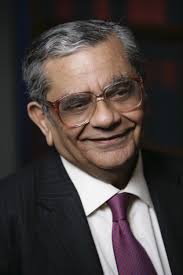J. N. Bhagwati: 7 Powerful Insights into His Life and Legacy
Dr. Jagdish Narayan Bhagwati, often known as J. N. Bhagwati, is a prominent figure in global economics. Renowned for his pioneering work on international trade, globalization, and development economics, Bhagwati’s contributions have influenced policymaking around the world. But what makes his journey so significant, and how have his ideas impacted societies and economies globally? Let’s dive into the life, legacy, and profound influence of this brilliant economist.
Early Life and Education
J. N. Bhagwati was born on July 26, 1934, in the city of Mumbai (formerly Bombay), India. Raised in a family with a strong academic foundation, Bhagwati developed a passion for economics early on. He attended Elphinstone College in Mumbai and later pursued his graduate studies in economics at the prestigious University of Cambridge. After completing his Ph.D. at the London School of Economics (LSE), Bhagwati embarked on a career that would span several decades and leave an indelible mark on global economic thought.
Major Contributions to Economics
J. N. Bhagwati’s work has been instrumental in shaping the field of international trade. He is best known for his theoretical contributions to the understanding of trade liberalization, economic development, and the relationship between globalization and national policy. One of his key contributions was his exploration of how trade policies affect developing countries and their economic growth.
Bhagwati’s advocacy for free trade and his analysis of the economics of trade barriers have made him one of the most influential voices in the debate on globalization. His famous theory on the “immiserizing growth” addresses the paradox in which a country’s economic growth through trade might sometimes harm its welfare, challenging traditional assumptions about the benefits of economic expansion.
He has written extensively on topics ranging from protectionism to economic integration, with influential books such as “In Defense of Globalization” (2004) and “The Wind of the Hundred Days” (2008), in which he explores the effects of economic policies on global trade and prosperity. Bhagwati’s clear and concise arguments have made him an essential figure in global trade discourse, respected both in academia and policymaking circles.
Impact on Global Policy and Development
Throughout his career, Bhagwati has served as an advisor to several international organizations, including the United Nations, the World Bank, and the World Trade Organization. His expertise in trade and development economics has influenced the policies of many developing nations, as well as major international trade agreements.
As an advocate for globalization, Bhagwati argued that free trade promotes development by providing access to larger markets, which can lead to more opportunities for economic growth. His insights helped policymakers in both developed and developing countries understand the complexities of trade liberalization, poverty alleviation, and economic integration in a rapidly globalizing world.
Daily Life and Personality
Despite his global fame, Bhagwati has maintained a grounded approach to his life and work. He is known for his intellectual rigor and discipline, often spending long hours studying, writing, and engaging with other economists and policymakers. Bhagwati’s daily routine is centered around research, which involves staying updated on the latest economic trends and developing solutions for complex global issues.
In his personal life, Bhagwati is described as an amiable and approachable individual, with a deep passion for mentoring younger economists and students. His commitment to educating the next generation of scholars in economics is reflected in his long tenure as a professor at Columbia University, where he continues to inspire students with his teachings.
J. N. Bhagwati’s Legacy and Significance
J. N. Bhagwati’s influence on both academia and policy is immense. His advocacy for free trade and globalization has reshaped economic thinking, particularly in terms of how developing countries should approach trade liberalization. His work on trade policy, particularly in the context of development economics, has provided invaluable insights into how nations can foster growth through external trade while protecting their economic interests.
Bhagwati’s contributions are not just limited to theory. He has been a vocal proponent of poverty reduction through economic growth and has emphasized the need for global cooperation to ensure that globalization benefits everyone, particularly the poor and marginalized. His writings continue to be a key reference for economists and policymakers alike.
FAQs About J. N. Bhagwati
1. What is J. N. Bhagwati known for?
J. N. Bhagwati is best known for his work on international trade, globalization, and economic development. He has been a strong advocate of free trade and has written extensively on its benefits and challenges, especially for developing countries.
2. What are some of J. N. Bhagwati’s most influential books?
Some of Bhagwati’s most influential works include “In Defense of Globalization”, where he argues for the benefits of globalization, and “The Wind of the Hundred Days”, which analyzes the impact of economic policies on global trade.
3. How has J. N. Bhagwati impacted global policy?
Bhagwati has shaped economic policies worldwide by advising international organizations and governments on trade liberalization, poverty alleviation, and the role of globalization in economic growth. His research has influenced policymaking, particularly in developing countries.
4. What is Bhagwati’s view on globalization?
Bhagwati supports globalization, arguing that it can lead to economic growth and development, especially for poor countries. However, he also acknowledges that globalization should be managed carefully to ensure that its benefits are distributed equitably.
5. What has J. N. Bhagwati contributed to the academic world?
Bhagwati has made significant contributions to economic theory, particularly in the fields of international trade and development economics. He has been a professor and mentor, educating countless students in the complexities of global economics.
Conclusion
J. N. Bhagwati’s legacy is one of intellectual brilliance and practical influence on the global economic landscape. His work has helped shape the way we understand trade, globalization, and development. As a staunch advocate for free trade and economic integration, Bhagwati has played a pivotal role in shaping international policy and improving the economic prospects of developing nations. His ideas will continue to be relevant in addressing global economic challenges for years to come, making him a towering figure in modern economics.










